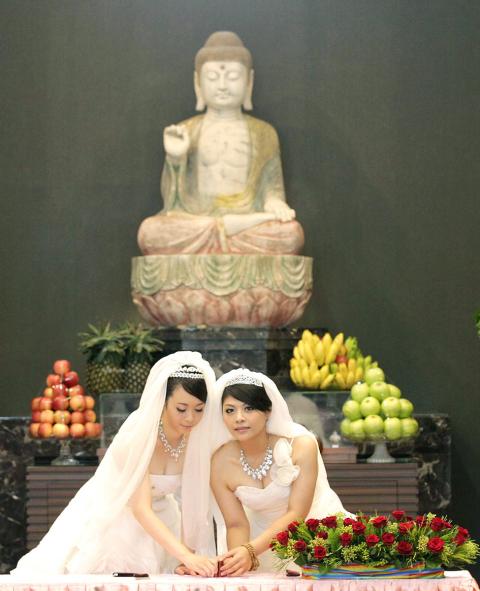Blessed by the Buddhist Master Shih Chao-hwei (釋昭慧), Yu Ya-ting (游雅婷) and Huang Mei-yu (黃美瑜) became the nation’s first lesbian couple to be married in a Buddhist ceremony yesterday.
“Do you, Ya-ting, take Mei-yu to be your companion for life, to have and to hold, in sickness and in heath, in good times and woe, for richer or poorer, keeping yourself solely unto her for as long as you both shall live?” Shih asked to Yu in front of more than 100 guests attending the wedding and a statue of a sitting Buddha, after reciting Buddhist chants and a teaching on the meaning of marriage.
“I do,” Yu answered.

Photo: Rueters
Shih then turned to Huang and asked the question, to which Huang also answered “yes.”
“You may exchange Buddhist beads now,” Shih said.
“Congratulations to both of you,” Shih said. “I am certain you will lead a life of happiness together, especially after you have overcome so much difficulty and societal discrimination. You have blessings not only from the Buddha, but also from those whom you may or may not know who are in attendance.”
The couple then stamped their seals on a marriage certificate, as did Shih and two friends of the couple who hosted the wedding.
Shih said that for Buddhists, marriage is a vow two people make to move their relationship to the next level and turn their love of themselves into love for the other.
The wedding took place at a Buddhist monastery in Guanyin Township (觀音), Taoyuan County.
Although the wedding was attended by a sizable crowd that gave the couple their best wishes, the absence of the couple’s parents reminded them that same-sex marriage is not so widely accepted by society.
“My parents have known my sexual orientation for many years, but at first, they couldn’t really accept it,” Huang told the media before the wedding. “So, when we started dating seven years ago, I took her [Ya-ting] home frequently to meet my family and let them know who I was going out with and gradually, they came to accept it.”
Huang said Yu’s parents only learned their daughter is a lesbian when they began to prepare for the wedding.
“Our parents originally agreed to come to our wedding, but they felt they were not prepared for the media exposure, so they decided not to come,” Huang said.
Another reality they have to face is that the wedding is not legally recognized. The couple has written an open letter to President Ma Ying-jeou (馬英九) urging the government to recognize same-sex marriage as soon as possible.
“Marriage is a basic right, and the Constitution protects the equal rights of each citizen of this country to enjoy equal rights, so there is no reason that same-sex marriage should be excluded form legal recognition,” said Chuang Chiao-ju (莊喬汝), a member of the Taiwan LGBT Rights Advocacy. “Ma calls himself a gay-friendly president so he should use his power to push for the legalization of gay marriage.”
Huang said they decided to have a Buddhist wedding because they are Buddhists and since around 80 percent of the population are more or less Buddhist, they hoped a wedding blessed by a Buddhist master would help change society’s views about same-sex marriage.

CHAOS: Iranians took to the streets playing celebratory music after reports of Khamenei’s death on Saturday, while mourners also gathered in Tehran yesterday Iranian Supreme Leader Ayatollah Ali Khamenei was killed in a major attack on Iran launched by Israel and the US, throwing the future of the Islamic republic into doubt and raising the risk of regional instability. Iranian state television and the state-run IRNA news agency announced the 86-year-old’s death early yesterday. US President Donald Trump said it gave Iranians their “greatest chance” to “take back” their country. The announcements came after a joint US and Israeli aerial bombardment that targeted Iranian military and governmental sites. Trump said the “heavy and pinpoint bombing” would continue through the week or as long

TRUST: The KMT said it respected the US’ timing and considerations, and hoped it would continue to honor its commitments to helping Taiwan bolster its defenses and deterrence US President Donald Trump is delaying a multibillion-dollar arms sale to Taiwan to ensure his visit to Beijing is successful, a New York Times report said. The weapons sales package has stalled in the US Department of State, the report said, citing US officials it did not identify. The White House has told agencies not to push forward ahead of Trump’s meeting with Chinese President Xi Jinping (習近平), it said. The two last month held a phone call to discuss trade and geopolitical flashpoints ahead of the summit. Xi raised the Taiwan issue and urged the US to handle arms sales to

State-run CPC Corp, Taiwan (CPC, 台灣中油) yesterday said that it had confirmed on Saturday night with its liquefied natural gas (LNG) and crude oil suppliers that shipments are proceeding as scheduled and that domestic supplies remain unaffected. The CPC yesterday announced the gasoline and diesel prices will rise by NT$0.2 and NT$0.4 per liter, respectively, starting Monday, citing Middle East tensions and blizzards in the eastern United States. CPC also iterated it has been reducing the proportion of crude oil imports from the Middle East and diversifying its supply sources in the past few years in response to geopolitical risks, expanding

Pro-democracy media tycoon Jimmy Lai’s (黎智英) fraud conviction and prison sentence were yesterday overturned by a Hong Kong court, in a surprise legal decision that comes soon after Lai was jailed for 20 years on a separate national security charge. Judges Jeremy Poon (潘兆初), Anthea Pang (彭寶琴) and Derek Pang (彭偉昌) said in the judgement that they allowed the appeal from Lai, and another defendant in the case, to proceed, as a lower court judge had “erred.” “The Court of Appeal gave them leave to appeal against their conviction, allowed their appeals, quashed the convictions and set aside the sentences,” the judges